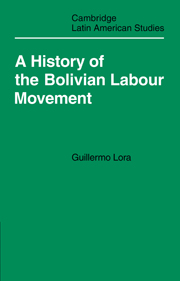Book contents
- Frontmatter
- Contents
- Editor's introduction
- Book 1 Protection versus free trade
- Book 2 Mineowners, artisans and Utopian socialists
- Book 3 Workers and the Liberal Party 1900–20
- Book 4 The nineteen-twenties
- Book 5 From the Chaco defeat to the Catavi massacre 1932–42
- Book 6 The workers become revolutionary
- Book 7 The rise and fall of the Central Obrera Boliviana
- Book 8 The military versus the unions
- Notes
- Editor's suggested reading
- Index
Book 4 - The nineteen-twenties
Published online by Cambridge University Press: 07 September 2010
- Frontmatter
- Contents
- Editor's introduction
- Book 1 Protection versus free trade
- Book 2 Mineowners, artisans and Utopian socialists
- Book 3 Workers and the Liberal Party 1900–20
- Book 4 The nineteen-twenties
- Book 5 From the Chaco defeat to the Catavi massacre 1932–42
- Book 6 The workers become revolutionary
- Book 7 The rise and fall of the Central Obrera Boliviana
- Book 8 The military versus the unions
- Notes
- Editor's suggested reading
- Index
Summary
The first strikes
President Bautista Saavedra, 1920–25
‘The year 1920 marked a crisis in Bolivian politics. The Liberals… were ousted in an almost bloodless revolution in July 1920 by the Republicans under the leadership of Bautista Saavedra.’ In power Saavedra repeated the bitter experience of Belzu. Like Belzu he found himself obliged to rely on the artisans for support, and like Belzu he was generous to his political enemies, offering them ministries and allowing exiles to return, but they responded only with contempt and intransigent opposition.
Saavedra deserves some credit for his efforts to draw up a coherent body of social legislation in an attempt to catch up with the achievements of economically more advanced societies, and for his willingness to make the government more responsive to the growing demands of the underprivileged sectors of society. His government introduced compensation for industrial accidents, a compulsory savings-scheme and an improved strike law, and set up the Institute of Social Reform. But it would be wrong to think that Saavedra adopted these laws simply because they coincided with some of his own personal theories. In fact, as this history is intended to show, the introduction of these reforms must be seen as a response to the campaigns mounted by the labour movement.
The workers had pinned their hopes for change on the various political upheavals which affected the country, and they had given enthusiastic support to successive governments in the hope of being granted political freedom and some measure of economic well-being.
- Type
- Chapter
- Information
- A History of the Bolivian Labour Movement 1848–1971 , pp. 110 - 168Publisher: Cambridge University PressPrint publication year: 1977



